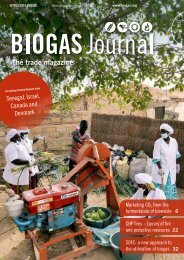Digestate as Fertilizer
Create successful ePaper yourself
Turn your PDF publications into a flip-book with our unique Google optimized e-Paper software.
Marketing strategies
Potential sales channels and customer groups
Producer
The private gardener customer group is an interesting
target market. First, high revenues are generated in this
sector: in Germany alone, almost 1.7 billion euros (€)
were generated in 2015 for fertilizers, soils, and plant
protection; the size of the total garden market in Germany
is approximately 18 billion euros. In the entire
EU, almost 90 billion euros are generated in the garden
market, and in the USA alone, nurseries and garden
centres generate total sales of over 40 billion US
dollars. And second, the final prices are quite high: in
some cases, up to €4/kg can be charged for branded
products, a multiple of the nutrient value. However, the
Determining the significance of different product
attributes for the purchase decision from the
choice decisions using statistical calculations
In the qualitative interviews, it quickly became clear
that most private gardeners have uncertainties when
buying fertilizers and soils. Many customers ,therefore,
take the product name (e.g. rose fertilizer) and the
brand as factors when deciding what to purchase. The
ingredients on the back of the packaging are also considered.
For many buyers, however, this information is
too complicated and not very meaningful. Some quotes
from the qualitative interviews
with private gardeners
are presented as examples.
End users
Biogas plant
Untreated /
upgraded
digestate
Contractor
Soil and
fertilizer
producer
Agricultural trader
Internet
Hardware shops and garden markets
Farm shop
integration of digestate in this sector depends on the
acceptance of fertilizer manufacturers, retailers, and
end customers. The preferences and attitudes of private
gardeners towards garden fertilizers are, therefore, crucial
and important criteria for marketing digestate in the
horticultural sector.
A study on how private gardeners make decisions was
conducted in Germany as part of the GÄRWERT project 1
by Nuertingen-Geislingen University and Kantar TNS:
Pre-study: 20 qualitative interviews with private
gardeners, evaluation by means of qualitative
content analysis
Institutional customers
Agriculture
Horticulture and
landscaping
Nurseries
Energy producers
Private customers
Hobby gardeners
Customers still do not understand
what their fertilizers
are composed of. However,
keywords such as “guano”
were understood by those surveyed.
In addition, “organic”
is another important, positive
criterion for some consumers.
It is worth mentioning
that fertilizers and flower and
flowerbed care products are
mainly purchased by women.
Another interesting result is
that consumers differentiate
greatly in some cases when it
comes to fertilizing: Organic
fertilizers are preferred for vegetable cultivation, whereas
mineral fertilizers are used for ornamental and pot
plants because they are not consumed.
Stinging nettle is a very good fertilizer:
it keeps away vermin and is said to
act as a growth accelerator. You also
hear that it was sometimes banned
because it is so good, and because it
is not necessarily... desired by the industry,
etc. I think it’s already banned
in France 2
Large-scale online survey with a total of over
1,000 participants, quantitative analysis
Questions on attitudes and socio-demography
Choice experiments: Participants were presented
with different fertilizers and soils and had to
choose between three products in twelve rounds
(discrete choice experiment)
1
We would like to thank the Fachagentur für Nachwachsende Rohstoffe e.V. (FNR) and the Federal
Ministry of Food and Agriculture (BMEL) for funding the GÄRWERT project (FKZ: 22402312).
Some of the preferences mentioned regarding the possible
starting materials in the digestate are contradictory:
Energy crops were generally evaluated rather
negatively. The digestates from it, on the other hand,
were appreciated for their homogeneity for possible
use in the garden. In contrast, private gardeners saw
the risk of unpleasant residues and impurities in digestate
from waste digestion plants, although they
generally assessed waste plants positively for ecological
reasons.
24


















